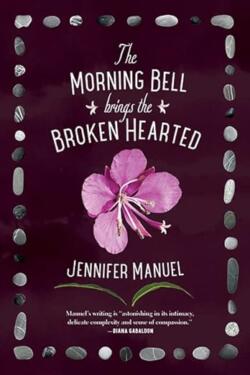Val's Book Reviews

The Morning Bell Brings the Broken Hearted
by Jennifer Manuel
Madeira Park: Douglas & McIntyre, 2023
$24.95 / 9781771623193

In The Morning Bell Brings the Broken Hearted, southern Vancouver Island author Jennifer Manuel has written an outstanding book full of compassion and hope.
The former college, elementary, and high school teacher’s story features a thirtysomething novice teacher, Molleigh Royston, who comes to a Nuu-chah-nulth First Nations village in central Vancouver Island.
Her teaching experience is limited but she has optimism and dreams, little realizing she’ll be in classrooms with children who possess very little of either.
Eleven-year-old Hannah Charlie is a particular challenge: “Hannah showed up in my classroom wearing long sleeves stretched over her hands. She was a tall girl, always angry, and as she often had before, she called me a redneck bitch because I was a ‘mamulthni’ and because I extended my hand out to her.”
Molleigh assumes that Hannah is simply exhausted from another day of trying to fit into a world where most of the other children disliked her or were afraid of her outbursts of anger. But all Molleigh’s attempts to help this angry girl are bluntly rebuffed: “Fuck You, Teacher.”

Similar efforts to understand her pupils prove equally difficult for Molleigh. Manuel slowly introduces other students—Kenny, Odelia, Candice Henry—each with conditions of varying severity. Characters, including colleagues and school administrators, are complex and memorably rendered.
Molleigh tries her best to understand her students by using her love for and ability at art. She draws small portraits of each one, confident the project will enable her to see inside their heads. When she later makes a serious cultural transgression, however, it triggers many strange happenings in the village. Giant boulders appear in front of her house, furniture moves around without explanation, phantom hands knock on doors at night.
Villagers come to believe that Molleigh is full of darkness and is causing these unworldly influences. In addition to the challenges of her students’ problems, which already nudge Molleigh toward quitting and returning home, these new occurrences make her even more determined to leave.
As the tension in the story builds the narrative becomes full of suspense; Manuel hints without fully explaining the mysteries.
Molleigh slowly comes to realize that the education system is failing remote Indigenous communities on many levels, and it is up to her and other teachers to understand the limits of her good intentions while immersing herself and becoming one with her community through the power of storytelling. Stories of despair that a colleague relates to her and to students are certainly not the answer. Hope, she sees, must be encouraged and spread.
Manuel’s prose is strong and pleasantly delightful as she floods her story with many descriptive passages such as—
“. . . gazing over the ragged fringe of hillside cedars… its undergrowth thorny and tangled, its canopy so thick not even the sun could guide your way. Each fibrous giant connected, as if by magic, through a fungal, subterranean circuit like the neural pathways of our own minds. . .”
And towards the end, Molleigh’s friend Joan says,
“Look around us. All this suffering and in the middle of it all, their brilliance. I mean take a look at your students now. Grace’s writing and Odelia’s art and Hannah’s dancing. Just think of it. One day, Grace might publish stories . . . stories that will turn the nation inside out with her voice.”
Perhaps the strongest message comes at the end of the novel when Manuel describes the evening Molleigh sees a wolf:
“It was almost the same colour as the giant stone edge of the rock face and stared down at me. I didn’t move a muscle. I stared back, mesmerized by its eyes. To see a wolf, Sophie Florence had said . . . is one of the greatest gifts . . . for a moment my understanding of life and the world expanded. Everything became clear, I would throw my whole heart into it.”
With a powerful message of faith about better days ahead, Manuel (The Heaviness of Things that Float) leaves her readers with a sense that while broken hearts might be inevitable, they can mend too and thrive as they move into the future.
Link to Original Review
“The Ormsby Review, named for pioneering historian and UBC professor Margaret Ormsby, is a remarkable and comprehensive online review of more British Columbia books than you ever imagined existing — the west coast publishing market is lively. It covers fiction, poetry, politics, memoir and much else, as well as a lot of local and west coast history.” – Christopher Moore, September 14, 2020.
Editor and Publisher: Richard Mackie
Mission Statement: The British Columbia Review, formerly The Ormsby Review, is a lively and inclusive Vancouver-based online journal devoted to the literature, arts, culture, and society of British Columbia. Our mandate is to review books by BC-based writers wherever they choose to publish them. We review books from the member publishers of the ABPBC (Association of Book Publishers of BC), but we also review books that are privately printed, self-published, or published by BC writers at publishing houses elsewhere in Canada or abroad. When possible, we also find BC reviewers. Our accessible and authoritative reviews and essays, written by experts in their fields, are packaged as illustrated magazine articles.
The British Columbia Review works with writers, publishers, and literary professionals across Canada to promote books published by BC writers or about British Columbia in all its diversity. We include books by all authors, regardless of race, age, ability, sexual orientation, gender or gender identity, ethnicity, religion, political belief, marital or family status, and/or status as Indigenous, Métis, or Inuit.
The editorial offices of The British Columbia Review are located near Commercial Drive in East Vancouver, in the traditional, unceded, and sometimes overlapping territories of the Musqueam, Squamish, and Tsleil-Wauuth peoples. Indigenous British Columbia, the land on which we live and create, extends over a large area comprising three culture areas, eight language families, and 32 distinct languages. We endeavour to review all books by and about Indigenous BC. Those reviews can be accessed directly here.
